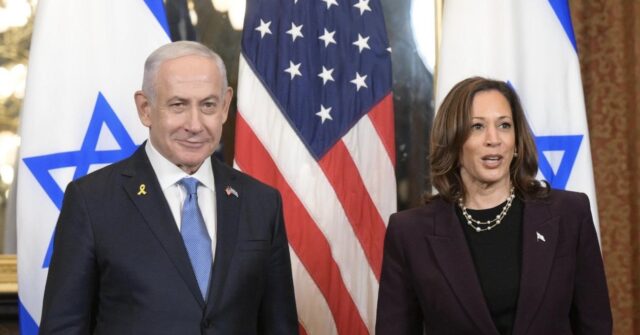In a notable diplomatic incident, President Joe Biden and Vice President Kamala Harris did not reach out to Israeli Prime Minister Benjamin Netanyahu following a significant event involving an attempted assassination orchestrated by Hezbollah. Over the weekend, Hezbollah launched three drones targeting Israel. While two drones were intercepted, the third managed to strike Netanyahu’s private residence. Fortunately, neither Netanyahu nor his wife was at home during the attack, resulting in no reported injuries. Despite the absence of physical harm, Netanyahu characterized the episode as an “assassination attempt,” expressing that this aggression from Iran would be regarded as a “grave mistake.” Reports indicate that Iran has sought to dissociate itself from Hezbollah’s actions, highlighting the complex political dynamic in the region.
In contrast to the U.S. leadership, other political figures responded to the drone attack. Former President Donald Trump reached out to Netanyahu, as did Speaker of the House Mike Johnson, signaling a level of concern and solidarity following the incident. On an international front, U.K. Prime Minister Keir Starmer also contacted Netanyahu, expressing alarm over the attack. However, the absence of communication from Biden and Harris has drawn scrutiny and criticism, emphasizing a perceived lack of support for Israel during a volatile moment in its security situation. Earlier that week, Biden had engaged in conversation with Netanyahu, particularly after Israeli forces eliminated Hamas’s leader, Yahya Sinwar. Even then, Biden and Harris had opposed Israel’s military movements in Rafah, indicating tensions in U.S.-Israel relations on strategic military support decisions.
The historical context of Biden and Netanyahu’s relationship has been characterized as icy, especially as Biden’s administration frequently addresses humanitarian concerns regarding the Israeli-Palestinian conflict. During a meeting between Harris and Netanyahu, she emphasized criticisms of Israel concerning the humanitarian crisis in Gaza, clearly reflecting the administration’s position that balances support for Israel with advocacy for Palestinian welfare. This approach has also resonated with progressive factions within the Democratic Party, advocating for a more balanced stance in Middle East policy which often scrutinizes Israeli military actions.
The reactions and lack of reactions from American officials following the Hezbollah attack feed into a broader narrative concerning U.S. foreign policy perceptions in the Middle East, particularly relating to Israel. The prevailing atmosphere is marked by heightened tensions between Israel and entities backed by Iran such as Hezbollah, interspersed with international calls for de-escalation and humanitarian support. As both domestic and international political leaders respond to incidents like the drone attack, their actions set the tone not only for bilateral relations but also for public opinion regarding the U.S. stance in Middle Eastern conflicts.
Joel B. Pollak, a prominent conservative voice and Senior Editor-at-Large at Breitbart News, has commented on the implications of these diplomatic dynamics. His publications often reflect on the shifting policies of different administrations and the impact on international relations. Pollak’s previous works and ongoing commentary emphasize a close examination of Trump’s foreign policy legacy compared to Biden’s current approach, outlining key differences in support for Israel. His analysis is indicative of a larger discourse on how U.S. leadership is perceived globally, particularly in contexts marked by conflict or military engagement.
In summary, the decision by Biden and Harris not to engage with Netanyahu following Hezbollah’s drone attack has raised eyebrows and highlighted the tense dynamics in U.S.-Israel relations. This event underscores the complexities of Middle Eastern geopolitics, where alliances and responses are intertwined with historical grievances and current humanitarian debates. Political reactions from figures across the spectrum, including Trump and foreign leaders, illustrate the varying degrees of support and the expectations that come with them, further complicating the narrative that defines U.S. engagement in the region.

